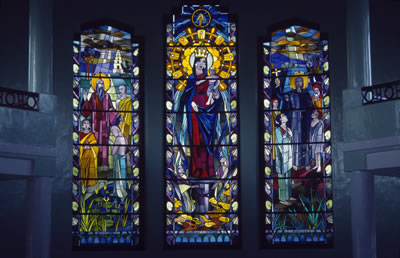What is a Patron Saint?
by Tim Lanigan

Anyone who grew up watching television star Danny Thomas in the 1950s and 1960s is familiar with St. Jude, the patron saint of hopeless causes and desperate situations. Anyone who has happened by Fifth Avenue in New York City on a March 17th has discovered, if they didn’t already know, that the patron saint of Ireland is St. Patrick.
St. Jude and St. Patrick are just two of hundreds of patron saints who serve as special protectors or advocates for churches; individuals; for countries, cities, and towns; for occupational groups; and for persons with special needs.
Most churches are named after saints, a tradition that arose when Christians began to build churches over the tombs of martyrs. For example, St. Peter’s Basilica in Rome rests on the site where St. Peter, the Apostle and first Pope, is thought to have been buried.
Countries have patron saints: the United States venerates the Immaculate Conception of Mary; Scotland, St. Andrew the Apostle. Some cities are even named after patron saints; for example, San Francisco was named after Saint Francis of Assisi in 1776, when the Spanish established a mission on the site.
When a child is baptized, he or she takes the name of a canonized saint, although children can also be named after some specific words with Christian associations. For example, the names Charity and Prudence, two Christian virtues, were at one time quite popular names. When a child is confirmed, the name of a canonized saint is chosen as the confirmation name.
One accusation leveled at Catholics is that they worship saints, a practice that should be reserved for God alone. This is a misunderstanding of Catholic teaching, which is that saints are venerated, but only God is adored. Is that a distinction without a difference? Not really.
Perhaps the distinction can best be explained by the reasons for which patron saints are chosen. One reason is that patron saints are chosen for their special ability not to act in the place of God, but rather to intercede with God on behalf of the petitioner. A heart patient, for example, might pray directly to God for relief from her condition. But she might also pray to St. John of God, the patron saint for people with heart conditions, to intercede with God on her behalf.
That this form of prayer is effective can be seen in the miraculous healings of individuals who have petitioned a particular saint to intercede for them. In fact, one cannot be canonized a saint without two miracles (direct interventions of God that cannot be explained by natural science) attributed to their intercession.
A second reason patron saints are chosen is not to worship them, but simply to honor them for the lives they led. In fact, it’s both a form of honor and a form of aspiration. Saints are canonized in recognition of their virtuous lives; specifically, making of their lives examples of the theological virtues of faith, hope, and charity, and the cardinal virtues of prudence, justice, temperance, and fortitude. By choosing special saints for baptismal names or professional patrons, we not only honor the lives they led but also use their good example to aspire to the kinds of lives we know we should lead ourselves.
Many patron saints gained their designation centuries ago; some are more recent. As occupations change, so does the need for new patron saints. Some may be chosen years from now among the ranks of those living today. Business executives have as yet no patron saint. Do you know someone in business whose life of heroic virtue would qualify them for such an honor? Now there’s an opening with a great future!
For reflection
Choose a patron saint (or saints) for your marriage with your spouse. Learn more about them, read their writings, and ask for their intercession when times are difficult.
Not sure where to start? Check out our list of married saints (below) or look up saints by patronage or date.
Sts. Louis & Zelie Martin
Bl. Ceferino Gimenez Malla
St. Elizabeth of Hungary
Bl. Frederic Ozanam
St. Jane France de Chantal
Bl. Franz Jagerstatter
St. Thomas More
St. Rita of Cascia
St. Gianna Molla
Bl. Peter To Rot
Bl. Giuseppe Tovini
St. Elizabeth Ann Seton




